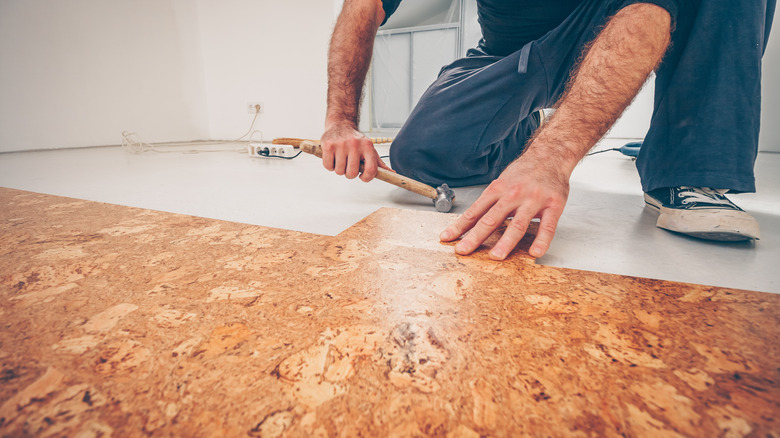Give Your Kitchen A Gorgeous Upgrade With This Budget-Friendly Flooring Option
Flooring in general can cost a small (or regular-sized) fortune, especially when it comes to the kitchen. Kitchen floors need to be extra hearty because they will be supporting electrical and plumbing appliances, and probably withstand the most foot traffic throughout the day. That means you don't want to go for the cheapest, lowest quality flooring, or something like peel-and-stick tiles, which are somewhat flimsy. But who wants to spring for hardwood floors in what is already likely to be the most expensive room in the home? Luckily, there's one flooring alternative that might just be perfect for your budget, and the function of a kitchen, and that's cork.
Yes, we mean that stuff plugged into your wine bottles, but its uses extend far beyond preserving a bottle of Cabernet Sauvignon. Cork, despite its foam-like appearance and feel, is made from wood bark, specifically the cork oak tree (Quercus suber L.). After cork planks are punched through to make, you guessed it, wine corks, it's pressed into flat slabs and flooring planks. This process provides kitchen flooring that is stunning, 100% natural, durable, and very, very affordable. On average, cork only costs $5 to $10 per square foot, compared to, say, $15 to $20 per square foot for tile. It's not the cheapest flooring out there, but it's one of the best values and options for kitchen floors.
It looks and works great
Cork provides a very unique aesthetic appeal, combining the warm tones of hardwood, with the one-of-a-kind veining found in natural stone such as marble or granite. It adds a ton of character to the kitchen, and can totally change the vibe of your space. In addition to its good looks, cork also happens to be an amazing pick for the kitchen due to its functionality and durability. Unlike hard tile and wood floors, cork offers cushioning, which is a dream for joint and back pain when spending hours at the sink and stove. And when you drop a plate or glass, it's less likely to shatter than on hard floor materials.
Cork is known to be quite water-resistant. This may seem surprising given its soft texture and porous appearance, but consider how you are able to flip a sealed wine bottle completely upside down without a drop escaping. That same liquid retention applies to cork flooring, especially when sealed properly with a heavy-duty varnish. This is ideal for kitchen floors, where spills will inevitably happen, whether you drop a vase of flowers or the dishwasher has a flooding malfunction. Simple damp mopping and vacuuming are enough to keep the floors looking great. As years wear on, you'll need to resand and seal the floors, but this is true of hardwood flooring as well.
Cork is planet-friendly
Besides all of the super-functional features and nearly incomparable affordability of cork flooring in the kitchen, the other major benefit is that it's sustainably harvested and naturally renewable. Though cork is made from trees, just like other hardwood floors, it doesn't require actually chopping any trees down. Cork oak trees are the only trees in the world that can be shaved down for bark without cutting the tree down entirely. That means there's no need for constant replanting, making for a uniquely sustainable growing and manufacturing process. As we mentioned previously, the cork sheets are first mined for wine corks, then the scraps are pushed together to create the flooring slabs. This process has zero waste. There are other green wood flooring options out there, like reclaimed wood, but it costs a small fortune and isn't a great choice for anyone sticking to an even moderate renovation budget.
Another planet-friendly quality about cork flooring is that it is very lightweight and can be packed flat. That isn't inherently environmentally friendly, but it significantly reduces carbon emissions during the packaging and shipping process. And because the planks can last for decades, if maintained properly, cork floors eliminate the need to buy new floors every few years, saving precious natural resources. When it is time to change the flooring, the cork is totally biodegradable.

